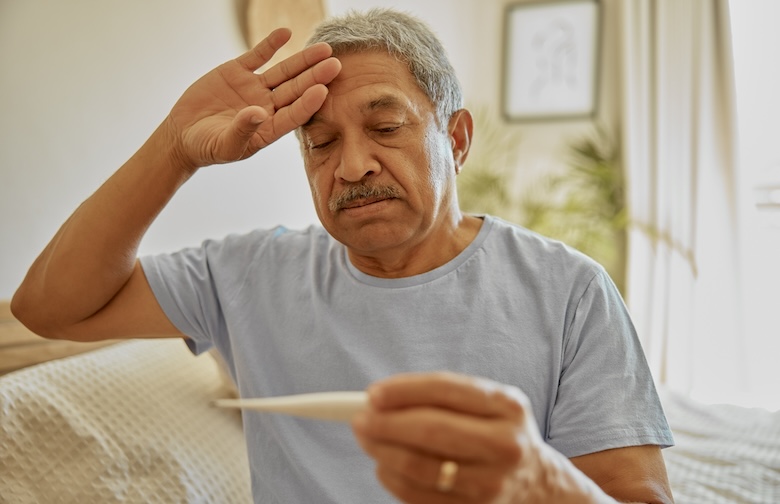
Smell and taste loss is no longer a reliable indicator of COVID‐19 infection, new research suggests
A new analysis of a national clinical database shows that a person’s risk of smell loss from COVID-19 is as low as 6% compared with initial variants.
July 14, 2023 At the beginning of the pandemic, smell and taste loss were considered common symptoms of COVID-19. More recently, researchers are seeing fewer cases associated with this symptom. (Getty Images)
At the beginning of the pandemic, smell and taste loss were considered common symptoms of COVID-19. More recently, researchers are seeing fewer cases associated with this symptom. (Getty Images)
By Olivia Trani
The risk of losing your sense of smell and taste from the most recent COVID-19 omicron variants is only 6-7% of what it was during the early stages of the pandemic, according to a study led by researchers at Virginia Commonwealth University’s School of Medicine. The findings were published in the journal Otolaryngology — Head and Neck Surgery.
“Our research has shown that incidents of COVID-related smell and taste loss have dramatically changed over the course of the pandemic, to the point now that smell loss is no longer a common symptom of infection,” said Evan Reiter, M.D., who is the medical director of VCU Health’s Smell and Taste Disorders Center, a professor in the Department of Otolaryngology at the VCU School of Medicine, and lead author of the study.
Reiter was joined by Daniel Coelho, M.D., a professor in the Department of Otolaryngology; Richard Costanzo, Ph.D., a professor emeritus in the Department of Physiology and Biophysics; and Evan French, a research informatics systems analyst at VCU’s C. Kenneth and Dianne Wright Center for Clinical and Translational Research.
VCU Health News spoke with Reiter to learn more about how these initially common symptoms of COVID-19 have evolved over time.
How prevalent was smell loss among infected individuals at the beginning of the pandemic, and how has this changed over the years?
At the beginning of the pandemic, smell and taste loss were considered common symptoms of COVID-19. Before viral tests were readily accessible, we relied a lot more on such symptoms to diagnose those infected. However, as different variants of the COVID-19 virus have emerged, the types of symptoms most commonly experienced changed as well. By analyzing data from more than 7 million COVID-19 patients across the United States, we found that the prevalence of smell and taste loss significantly declined with newer COVID-19 variants.
What do these new findings mean for people who suspect they have COVID-19 or other illnesses?
Our data shows that smell and taste loss is no longer a reliable indicator of COVID‐19 infection. This means that you can’t rule out COVID-19 if you are feeling sick but haven’t lost your sense of smell or taste. This also means that if you have lost your sense of smell or taste, it’s not a guarantee that it’s from a COVID-19 infection.
Do we know why smell and taste loss are no longer common symptoms of COVID-19?
It’s unclear exactly why the prevalence of smell and taste loss has dropped over time as we don’t have data on what’s causing this decline. Though, I would speculate that this might be related to our increased immunity to the virus, either through vaccines or having an earlier infection, as this typically helps reduce the severity of future infections.
How does smell loss impact a person’s daily life?
While the risk of smell loss is far less prevalent than the initial waves of COVID-19, we are still seeing patients who have either completely lost or have a distorted sense of smell. Earlier research conducted by our team revealed that two years after infection, 7.5% of people who developed smell loss from COVID-19 had not regained the sense, and 54% only partially recovered it.
Smell and taste loss can take a significant toll on quality of life in many different ways. In 2020 and 2021, we surveyed individuals who lost their sense of smell from COVID-19, and 43% of the participants reported feeling depressed. One of the biggest concerns from people with smell loss is their personal safety, such as the inability to smell smoke, detect a gas leak or identify spoiled food. There are also a fair number of patients who have trouble maintaining a healthy diet because there are so many foods that are displeasing to them. Luckily, there is a lot of work being done in hopes of finding an effective treatment for those affected by this condition.
The study received grant funding from the MEDARVA Foundation. The VCU research informatics team that provided data from the National COVID Cohort Collaborative was partially funded by the National Institutes of Health’s Clinical and Translational Science Award, awarded to VCU’s Wright Center.



